Recycling takes hold with building services group
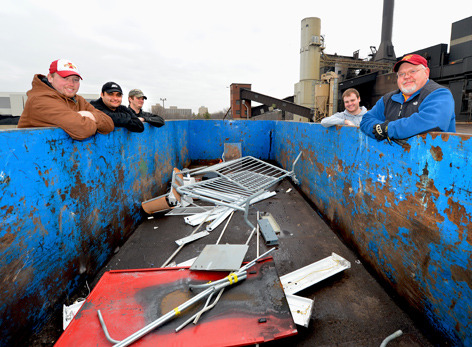
(clockwise, from left) Students Brent Vanderloop, Jabed Sarmiento, Jacob Bishop and Ben Ritland join their supervisor Eric Zierke around the east campus bin where they collect scrap metal for recycling. Photo by Bob Elbert.
Their efforts likely won't earn any international citations. Or any state ones, for that matter. But the construction staff in Iowa State's building maintenance services takes pride in recycling demolition and construction materials from their projects. During 2012, they recycled more than 40,000 pounds of plaster and concrete and more than 162,000 pounds of scrap metal. More than 20,000 pounds of wood was reused – as scrap kindling for the coil boilers in the power plant, by ISU carpenters or perhaps by community members who frequent the free wood site on Haber Road.
This team has a skill set that would make any homeowner jealous. They replace broken windows and missing doorknobs, they create custom furniture and scientific props, they repair vandals' work, they adjust doorways or countertops to make rooms accessible and compliant with federal regulations. But their "bread and butter," as supervisor Eric Zierke calls it, is small, individual classroom and lab remodels. Because each one costs less than $100,000, they don't have to be bid to outside contractors. Most often, Zierke and his team collaborate with staff from room scheduling or IT Services' classrooms team to convert spaces from dated to state-of-the-art. In-house electricians, carpenters, plumbers and painters lend their skills, too.
The pilot
No one asked them to start recycling, Zierke recalls, but about three years ago, "we decided to hold ourselves to the same standards as our capital projects people. It's the right thing to do."
What started as a yearlong experiment evolved into a regular practice.
Any furnishings or equipment that might find a second home are taken to ISU Surplus for public sale. Scrap metal -- for example, from ceiling grids, fume hoods, furniture, pipes -- is delivered for recycling to east Ames' Bell Salvage, where the receipts go back into project budgets. Plaster, brick and concrete block – if the load is at least one third of a dump truck -- can be repurposed locally with Manatts. And the university is just entering a ceiling tile recycling program sponsored by the Armstrong company. Asbestos-free varieties of ceiling tile will be stacked on pallets and loaded into a semitrailer. When the trailer is full, Armstrong hauls it away.
Keys to success
Zierke credits two factors for the recycling program's success. First, the tweaking of standard computer software by facilities programmer Ron Kinyon allows Zierke's team to manage projects and track what is recycled. Zierke said student employees, four part-timers during the school year and as many as six full-timers during the summer, keep recycling affordable.
"It's hard, dirty work, but they follow directions really well," Zierke said. "I couldn't justify all the recycling we do if I was paying tradesman-level wages for what they do for us."
Rajala named next dean of the College of Engineering
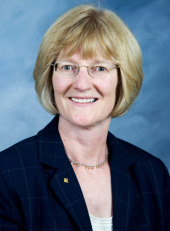
Sarah Rajala
Sarah Rajala (RYE-ah-lah) will become the next dean of the College of Engineering on April 1, 2013. Rajala has been dean of engineering at Mississippi State University since 2008.
"Iowa State's engineering students, faculty and staff, as well as the entire campus community, were excited to hear Dr. Rajala's vision for the college," said Jonathan Wickert, senior vice president and provost. "Sarah is an internationally known academic leader who brings a tremendous wealth of experience to the position, and I am confident she will accomplish great things during her tenure."
During her years of leadership at Mississippi State, Rajala raised more than $30 million in private gifts, revised the College of Engineering's strategic plan and established a diversity advisory council to improve the success rates of students of color and women.
"Sarah Rajala has an outstanding record as a faculty member and academic leader," said president Steven Leath. "In addition, she has consistently broken new ground for women in engineering throughout her career, so she will be an exceptional role model for young women in the STEM fields. I look forward to having her on our team."
Previously, Rajala served as department chair of electrical and computer engineering at Mississippi State, and associate dean for research and graduate programs at North Carolina State University, Raleigh. She chairs the Global Engineering Deans Council, and is a former president of the American Society for Engineering Education (ASEE).
"I am honored to serve as Iowa State's next engineering dean," Rajala said. "The college has a great track record of education, discovery and service to Iowans. I look forward to building on that success, and raising the profile of the program to new heights."
Rajala earned her bachelor's in electrical engineering from Michigan Technological University, Houghton, Mich., and master's and Ph.D. degrees from Rice University, Houston. She is a fellow of the American Association for the Advancement of Science (2008), ASEE (2007) and the Institute of Electrical and Electronic Engineers (2001).
Wickert, the former Engineering dean, was promoted to his current post in July. Mufit Akinc, former department chair and professor of materials science and engineering, is serving as interim dean.
Turbine is turning
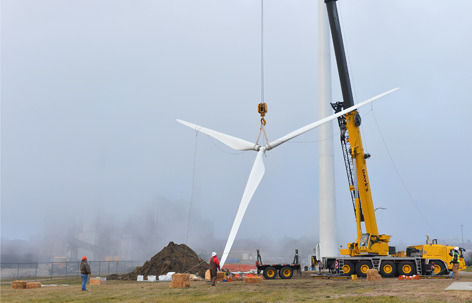
The blustery months of winter are some of the most productive for wind turbines. So the new wind turbine on the northeast corner of campus should be able to hit the ground running.
The blades of the turbine began generating kilowatts Wednesday, just two days after workers hoisted it into place.
The 160-foot, 100-kilowatt turbine sits between the university power plant and the CyRide facility.
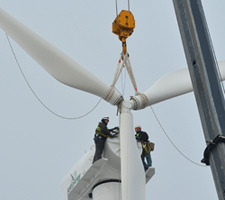
Workers do some high-level work on the turbine blades. Photos by Bob Elbert.
Iowa State owns the land on which the turbine sits, but PUREnergy of Ohio owns and maintains the turbine. Under the agreement with PUREnergy, Iowa State will take all of the power generated by the turbine.
That amounts to about 183,330 kilowatt hours of energy annually, which is similar to the amount of electricity consumed by Catt Hall, East Hall or the Hub. The turbine should produce about 0.12 percent or $18,000 worth of Iowa State's annual electricity needs.
Turbine facts
- 100 Kw unit rating
- Manufactured by Northern Power Systems in Vermont
- Blades are fiberglass-reinforced polyester (FRP)
- Rotor diameter is 70 feet
- Rotor will spin at 51 rpm at rated capacity
- Hub height is 120 feet
- Overall height: 160 foot tall, compared to 230 feet for the Power Plant stack and 168 feet for the Marston Water Tower
- Wind turbine operating range is 7-56 mph wind speeds
- Maximum power output is 31 mph wind speed
- 20-year anticipated lifetime
- The university will purchase the electricity produced at a cost of $0.10 per kilowatt-hour
- The concrete foundation is 27 feet in diameter and 4 feet thick and contains over 85 cubic yards of concrete
Winter break: What you need to know

With a university-approved partial shutdown over the holidays, this campus cardinal may be hard-pressed for human companionship. Photo submitted to ISU Photostream by Alyssa Miller.
For the past few years, Iowa State administrators have offered departments and units the option of closing down -- partially or fully -- over the holidays. That trend continues this year with a partial university shutdown planned for Dec. 22 through Jan. 1.
Open or closed?
In September, university officials approved a partial shutdown of campus during winter break. This period includes three university holidays (Dec. 24, 25 and Jan. 1), four weekend days and four workdays (Dec. 26-28, 31). Employees who choose not to work Dec. 26-31 may use vacation time or take unpaid leave. The partial shutdown is optional; the university is not requiring departments to close. Units involved in critical services, maintenance and research will remain open.
Building supervisors should contact Bob Currie in facilities planning and management by 5 p.m. Dec. 19 to indicate whether a building will be closed or to request a temperature setback.
If your department or building will shut down during break, remember these tips to keep your office safe and energy-efficient.
Flip switches and more
- Shut down all computers, printers and other accessories. Leave your office computer on if you need remote access from home, but power off the monitor, printer, speakers, etc. A computer's sleep mode uses less energy than full power, but information technology services guidelines recommend shutting down computers completely to protect data. A machine may be left on during break if it's providing access to a critical application. If possible, plug computers and printers into a power strip and then shut off the power strip before you leave.
- Turn off and unplug copiers.
- Shut off and unplug small appliances, like coffeepots and microwaves.
- Unplug chargers for electronic devices, such as cell phones.
- Check faucets in bathrooms and break rooms to make sure they are completely turned off and not dripping. If you notice a dripping faucet, contact the FPM Service Center, 4-5100.
- If you can manually adjust the thermostat in your office, turn it down to 65 degrees.
- Close fume hood sashes completely or open them only minimally.
- Shut down unnecessary climate-controlled plant growth chambers.
- Shut down cooling water systems to eliminate potential flooding issues.
- Remember to turn off your office lights and as much public lighting (hallways, bathrooms, conference rooms) as possible before you leave.
- Check windows to make sure they're tightly closed.
Keep in touch
If your department is closing over break, discuss how to handle incoming phone calls. One option is to direct all departmental calls to one voicemail box to be checked periodically by designated employees during the break. Employees also should change their personal voicemail and email messages. Consider stating the dates you will be absent, and if you'll be checking your voicemail or email messages. If necessary, include an off-campus number where you can be reached. Also consider posting holiday hours on your department's website.
Wear your boots
Facilities planning and management crews will work reduced hours during the partial shutdown. From Dec. 22 through Jan. 1, snow removal will be limited, which means parking lots and building entrances may not be plowed by 8 a.m. FPM staff also will not plow lots or sweep sidewalks for less than 2 inches of snow outside of weekday business hours (Monday through Friday, 7 a.m. to 4 p.m.).
Winter break schedules
Following is a list of closures for various campus facilities during winter break. But you may want to call ahead or check websites before venturing out.
Winter break
Athletics ticket office, Jacobson Athletics Building
Closed: Dec. 24-27, Dec. 31, Jan. 1
Holiday hours: 8 a.m.-5 p.m. Dec. 28
Hilton Coliseum ticket office opens one hour prior to events.
Brunnier Art Museum (290 Scheman)
Closed: Dec. 17-Jan. 7
Christian Petersen Art Museum (1017 Morrill)
Closed: Dec. 15-Jan. 13
Farm House Museum (central campus)
Closed: Dec. 15-Jan. 13
Hotel Memorial Union
Closed: 5 p.m. Dec. 21-8 a.m. Dec. 26
ISU Dining
ISU Postal and Parcel
Operating normal hours. Service will continue to accessible buildings. Temporary schedule changes may occur.
Lied Center/Beyer Hall/State Gym
Winter break hours (PDF)
Maintenance Shop, Memorial Union
Closed: Through Jan. 13
Memorial Union
Closed: 5 p.m. Dec. 21-8 a.m. Dec. 26
Reiman Gardens
Closed: Dec. 25 and Jan. 1
University Book Store
Closed: Dec. 22-25, Dec. 30, Jan. 1, Jan. 6, Jan. 13
Winter break hours: Monday-Friday, 8 a.m.-5 p.m.; Saturday, 10 a.m.-4 p.m.; closed Sundays except Dec. 16 (open noon-4 p.m.)
University Library (all sites)
Closed: Dec. 15-16, Dec. 22-Jan. 1, Jan. 5-6, Jan. 12-13
No evening hours Dec. 17-21, Jan. 2-4, Jan. 7-11
Home for the holidays
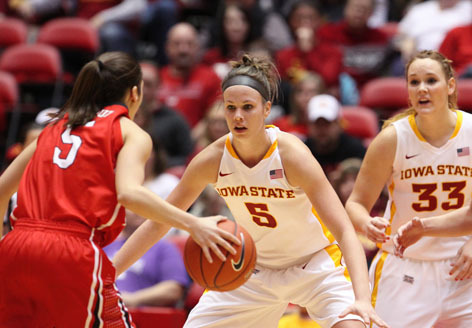
The Cyclone women's basketball team will make Hilton Coliseum its home for the holidays, playing three games over a five-day span during winter break. The action kicks off at the Cyclone Challenge Dec. 29-30. ISU takes the court at 3:30 p.m. both days, facing Air Force Dec. 29 and Alabama State on Dec. 30 (1 p.m. games are included in the ticket price). The Cyclones open Big 12 Conference play on Jan. 2 against Texas (7 p.m.). General admission tickets for all games are $10 for adults and $5 for youth (reserved seats $12 adult, $6 youth). Photo courtesy of Athletics Communications.
Eat, drink and be merry

Get a taste of merry old England -- literally and figuratively -- at the 48th annual ISU Madrigal Dinner, Jan. 18 and 19, 2013 (5:30 p.m., Great Hall, Memorial Union).
The evening begins with dancers, a trumpet fanfare and a royal procession featuring the king and queen, squires, town crier, court jester and others dressed in 16th-century English regalia. Performers also will parade through the Great Hall with a boar's head, a bowl of wassail punch and flaming plum pudding.
Guests will enjoy a feast fit for a king. Spicy wassail punch and salad drizzled with raspberry vinaigrette will prepare the palate for a main course of roast pork sirloin, pease porridge, herb-roasted potatoes and bread. The meal concludes with plum pudding (with lemon and hard sauces), cheese, fruit and coffee. Alternative meals are available for vegetarians, diabetics and others with special dietary considerations; requests must be made in advance.
Throughout the evening, several ISU music and dance groups, including the Iowa State Singers, Musica Antiqua, the Music Men and Orchesis II, will perform. A light-hearted play with audience participation will round out the festivities.
Tickets, $42 ($38 for ISU students and groups of 10 or more), are available by phone (4-8349), in person at the MU ticket office (11 a.m.-5 p.m.), or online (3 percent convenience charge applies). Contributed photo.
